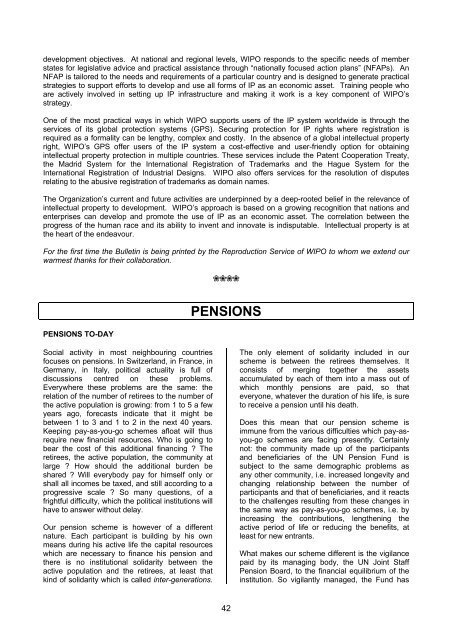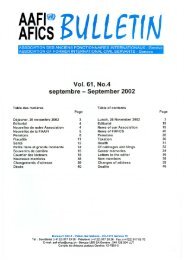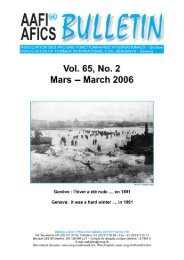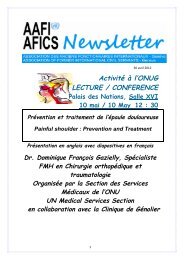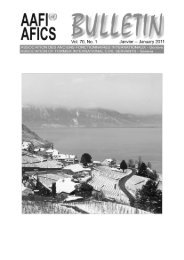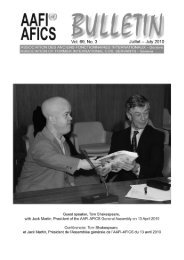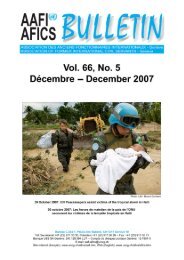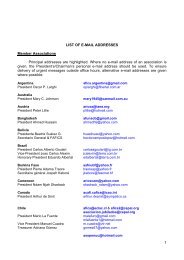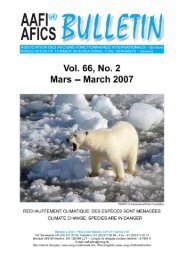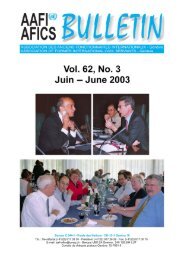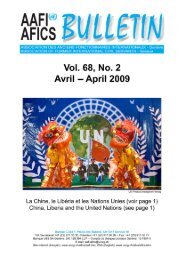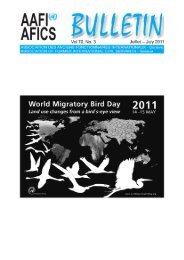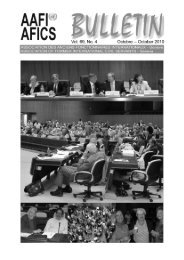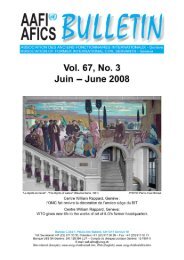nouvelles de notre association - aafi-afics - UNOG
nouvelles de notre association - aafi-afics - UNOG
nouvelles de notre association - aafi-afics - UNOG
Create successful ePaper yourself
Turn your PDF publications into a flip-book with our unique Google optimized e-Paper software.
<strong>de</strong>velopment objectives. At national and regional levels, WIPO responds to the specific needs of member<br />
states for legislative advice and practical assistance through “nationally focused action plans” (NFAPs). An<br />
NFAP is tailored to the needs and requirements of a particular country and is <strong>de</strong>signed to generate practical<br />
strategies to support efforts to <strong>de</strong>velop and use all forms of IP as an economic asset. Training people who<br />
are actively involved in setting up IP infrastructure and making it work is a key component of WIPO’s<br />
strategy.<br />
One of the most practical ways in which WIPO supports users of the IP system worldwi<strong>de</strong> is through the<br />
services of its global protection systems (GPS). Securing protection for IP rights where registration is<br />
required as a formality can be lengthy, complex and costly. In the absence of a global intellectual property<br />
right, WIPO’s GPS offer users of the IP system a cost-effective and user-friendly option for obtaining<br />
intellectual property protection in multiple countries. These services inclu<strong>de</strong> the Patent Cooperation Treaty,<br />
the Madrid System for the International Registration of Tra<strong>de</strong>marks and the Hague System for the<br />
International Registration of Industrial Designs. WIPO also offers services for the resolution of disputes<br />
relating to the abusive registration of tra<strong>de</strong>marks as domain names.<br />
The Organization’s current and future activities are un<strong>de</strong>rpinned by a <strong>de</strong>ep-rooted belief in the relevance of<br />
intellectual property to <strong>de</strong>velopment. WIPO’s approach is based on a growing recognition that nations and<br />
enterprises can <strong>de</strong>velop and promote the use of IP as an economic asset. The correlation between the<br />
progress of the human race and its ability to invent and innovate is indisputable. Intellectual property is at<br />
the heart of the en<strong>de</strong>avour.<br />
For the first time the Bulletin is being printed by the Reproduction Service of WIPO to whom we extend our<br />
warmest thanks for their collaboration.<br />
<br />
PENSIONS TO-DAY<br />
PENSIONS<br />
Social activity in most neighbouring countries<br />
focuses on pensions. In Switzerland, in France, in<br />
Germany, in Italy, political actuality is full of<br />
discussions centred on these problems.<br />
Everywhere these problems are the same: the<br />
relation of the number of retirees to the number of<br />
the active population is growing: from 1 to 5 a few<br />
years ago, forecasts indicate that it might be<br />
between 1 to 3 and 1 to 2 in the next 40 years.<br />
Keeping pay-as-you-go schemes afloat will thus<br />
require new financial resources. Who is going to<br />
bear the cost of this additional financing ? The<br />
retirees, the active population, the community at<br />
large ? How should the additional bur<strong>de</strong>n be<br />
shared ? Will everybody pay for himself only or<br />
shall all incomes be taxed, and still according to a<br />
progressive scale ? So many questions, of a<br />
frightful difficulty, which the political institutions will<br />
have to answer without <strong>de</strong>lay.<br />
Our pension scheme is however of a different<br />
nature. Each participant is building by his own<br />
means during his active life the capital resources<br />
which are necessary to finance his pension and<br />
there is no institutional solidarity between the<br />
active population and the retirees, at least that<br />
kind of solidarity which is called inter-generations.<br />
The only element of solidarity inclu<strong>de</strong>d in our<br />
scheme is between the retirees themselves. It<br />
consists of merging together the assets<br />
accumulated by each of them into a mass out of<br />
which monthly pensions are paid, so that<br />
everyone, whatever the duration of his life, is sure<br />
to receive a pension until his <strong>de</strong>ath.<br />
Does this mean that our pension scheme is<br />
immune from the various difficulties which pay-asyou-go<br />
schemes are facing presently. Certainly<br />
not: the community ma<strong>de</strong> up of the participants<br />
and beneficiaries of the UN Pension Fund is<br />
subject to the same <strong>de</strong>mographic problems as<br />
any other community, i.e. increased longevity and<br />
changing relationship between the number of<br />
participants and that of beneficiaries, and it reacts<br />
to the challenges resulting from these changes in<br />
the same way as pay-as-you-go schemes, i.e. by<br />
increasing the contributions, lengthening the<br />
active period of life or reducing the benefits, at<br />
least for new entrants.<br />
What makes our scheme different is the vigilance<br />
paid by its managing body, the UN Joint Staff<br />
Pension Board, to the financial equilibrium of the<br />
institution. So vigilantly managed, the Fund has<br />
42


